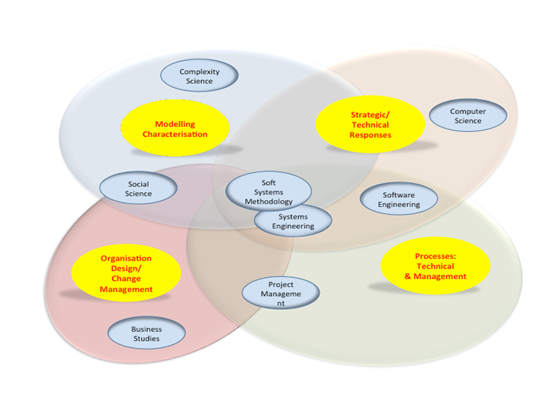Main Page
Enterprise Systems Engineering Interest Group
- Programme of Events - Useful Papers and Links - Bibliography - How to Join
Background
The emerging discipline of Enterprise Systems Engineering aims to integrate and study in a holistic manner a range of associated topics which together cover how organisations apply systems engineering and allied disciplines to the challenges of developing complex, interdependent products, as well as to designing and transforming the organisations (enterprises) themselves.
There is a growing body of literature conference sessions devoted to the subject, including textbooks and a chapter in the recently-published SE Body of Knowledge (SEBoK). Some have gone as far as to say that the future of Systems Engineering as a discipline depends on how it responds to trends in ESE and the Report of the INCOSE Executive Summit arising from IS 2012 in Rome supports this view.
Within the UK, a Working Party was established in mid-2011 to look into the subject. They have met a number of times to scope the subject and consolidate thinking through discussions and workshops, reporting regularly to the Architecture Working Group. Additional achievements of the ESE WP and its members over the period include:
- Acting as a commenting group for the SEBoK Chapter while in editorial form, forming links with the editor (James Martin).
- Publication of a revue article entitled Enterprise Systems Engineering – An Emerging Discipline - in the July issue of UK INCOSE’s Preview.
- Development and delivery of a 3-hour tutorial at ASEC 2012 (Warwick University), which was fully booked.
- Delivery of a paper entitled Enterprise Systems Engineering – Practical Challenges and Emerging Solutions at ASEC 2011 and INCOSE IS in July 2012 (Rome).
As a result of the above and feedback obtained from delegates at the ASEC 2012 Tutorial, there is support for moving to the next stage and the formation of an Interest Group, the scope of which is set out below.
ESE Interest Group – Scope and Ways of Working
Scope
The ESE IG will be concerned with furthering our understanding of all aspects of Enterprise Systems Engineering, with particular reference to the contribution which systems engineering and systems thinking can make to the subject. The scope will include the following main aspects identified by the ESE WP:
- Conceptual Foundation for Enterprise Systems Engineering: Understanding and classifying types of enterprises and their characteristics, both hard and soft; drawing upon the related fields of complexity science and sociology to explain and predict the interactions between processes, and the behaviour of enterprises undergoing change. The aim here would be to consolidate what is known from practical experience for embodiment in schemas and models which might allow us to choose between viable response strategies.
- Enterprise Technical Strategies: for example enterprise architecture and associated frameworks; service-oriented architectures, framework architectures and composible systems; generic platform architectures crossing multiple systems; re-usable architectural patterns; strategic management of technology; and integrated technical support environments, covering modelling, integration and organisation-level information sharing.
- Enterprise Processes and Management: linking enterprise management to organisational objectives; enterprise systems of systems engineering; agile development methods to counter uncertainty; management of programmes and portfolios integrated with appropriate engineering processes; commercial policies and contract management; and decision-making techniques at all levels to support the above.
- Organisational Design & Change Management: shaping the organisation for adaptability and to match the types of complexity involved; top-down vs. peer-to-peer collaboration and governance strategies; enterprise leadership styles; implementing, sustaining and measuring change; role of academics and advisors.
This is a long list, and the IG will be guided by its members as to the areas for specific attention.
There is a close overlap between these aspects of the subject, and with other disciplines, as shown in the diagram. These overlaps will be explored as far as time allows and members wish.
Ways of Working
The ESE IG will be overseen by a small steering group. As a starting position, this will comprise existing members of the ESE WP - Peter Bryant, Richard Smith, Dave Mawby, Jeremy Hilton, Roger Barrett and Peter Brook (Chair). However, this can change as members join and the positions are opened for others to take up. The IG will draw its members from the full membership of INCOSE UK, covering as far as possible the full range of interests – ie Government, Industry, SME’s and Academia - and conduct the following activities:
- Discussion meetings, typically led by invited speakers, to explore aspects of the subject as set out above (it is envisaged that around 4 such meetings would be held each year).
- Continuing liaison with the SEBoK team to influence the further development of the published body of knowledge.
- Liaison as required with other professional groups in the field.
- Publication of activities and key products of wider interest (for example bibliographies) on the UK INCOSE Website.
The IG will report its activities at regular meetings of the AWG and, if required, report to the UK Council.
Peter Brook ESE IG Chair
Other activities may be added according to the wishes of members.
Further background on the scope of the subject and the Interest Group can be found Here
